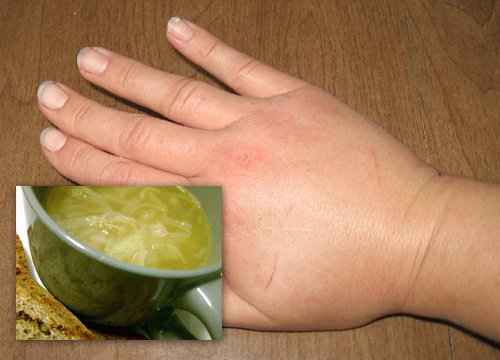How to Use Onion for Fluid Retention

Sometimes you might think you’ve put on a few extra pounds, but you may actually be retaining fluids. Maybe you’re eating too much salt, have an overtaxed kidney, are experiencing a hormonal imbalance, or simply aren’t eliminating fluids properly. Find out the benefits of onion for fluid retention in today’s article.
In this article, we’ll show you a simple and natural plan that will help you get rid of all the excess fluid in your body that’s making you feel heavy and swollen. Find out how to eliminate fluid retention in just a month by following these simple tips for your diet and with the help of natural supplements.
The benefits of onion for fluid retention
What you’ll be eating most of during the month is onions, a medicinal food that’s been used since ancient times as a potent diuretic and anti-inflammatory agent. Additionally it can greatly improve the condition of inflamed kidneys. It has a very mild impact on the body, and, because of that, doesn’t have any adverse effects.
So, how will you use onion for fluid retention? Well, every day you’ll consume an onion broth. If you make a large batch of it, then you won’t have to prepare it every day.
Another great benefit of this soup is that you can make it tastier by adding seawater, which can be found in health food stores and some supermarkets. Seawater not only has no negative sodium content, but also helps remove excess liquid from the body. That’s why we recommend it as a replacement for standard table salt whenever you can.
Ingredients:
- 2 pints of water
- 3 large onions
- 1 cup of seawater
First of all, slice the onions and boil them in water for at least half an hour. Keep the liquid. You can add more flavor with a little lemon juice, if you wish.
How should you drink it?
This broth should be consumed throughout the day, but separate from your meals. It’s best to drink it half an hour before you eat.
The cooked onions can then be used to make vegetable creams and sauces.
A grapefruit a day
Grapefruit is a highly cleansing citrus fruit that benefits both your kidneys and the liver. That’s why we recommend eating a grapefruit every day for this 30 day cure.
The best times are in the morning on an empty stomach before breakfast, or before you go to bed, after dinner. If the taste is too bitter for you, add a little cinnamon and honey.
Natural supplements
There are two herbs that will help enhance the diuretic effects of this treatment: green tea and horsetail grass.
- Green tea can help the body to eliminate excess fat. It has slightly stimulating effects and has been shown to have some anti-cancer properties.
- Horsetail grass: In addition to being a diuretic, horsetail also helps reduce kidney inflammation and improves the health of your hair, skin, and nails thanks to its silica content.
Both of these can be consumed in their tea form, but if you don’t feel like drinking additional fluids alongside your onion broth, you can take them as a supplement in capsule or tablet form.
Feel free to choose either one throughout the 30 days to generate lasting diuretic effects.
Foods that worsen fluid retention
As you follow this simple treatment, it’s also important that you avoid any foods that can harm your kidneys and cause more water retention. The worst ones are:
- Salt – you can use a little sea salt in your cooking, but avoid table salt
- Precooked or fried foods
- Canned foods
- Coffee
- Soda
Read more: The Dangers of Eating Canned Food
Heat for your kidneys
As we’ve implied above, the most important organs in the body for fighting fluid retention are your kidneys. As kidney health is closely tied to your energy levels, they often suffer in very cold weather, and the most common symptom is pain in your lower back.
Whether you’re feeling this pain or not, a great habit to get into is to apply a little heat on the area every evening, roughly in the middle of your back. You can use a hot water bottle or a heating pad for 15 to 30 minutes before going to bed.
Take care with diuretic medication
We suggest you try this natural treatment before resorting to diuretic drugs, which can have side effects like excessive sensitivity or nervousness. If you do take them by prescription, it’s a good idea to eat plenty of foods that are rich in potassium to counteract those effects, like tomatoes, vegetable broths, and bananas.
All cited sources were thoroughly reviewed by our team to ensure their quality, reliability, currency, and validity. The bibliography of this article was considered reliable and of academic or scientific accuracy.
- Walker, A. F., De Souza, M. C., Vickers, M. F., Abeyasekera, S., Collins, M. L., & Trinca, L. A. (1998). Magnesium supplementation alleviates premenstrual symptoms of fluid retention. Journal of Women’s Health. https://doi.org/10.1089/jwh.1998.7.1157
- Ebrahimi, E., Khayati Motlagh, S., Nemati, S., & Tavakoli, Z. (2012). Effects of magnesium and vitamin b6 on the severity of premenstrual syndrome symptoms. Journal of Caring Sciences. https://doi.org/10.5681/jcs.2012.026
- Horita, S., Seki, G., Yamada, H., Suzuki, M., Koike, K., & Fujita, T. (2011). Insulin resistance, obesity, hypertension, and renal sodium transport. In International Journal of Hypertension. https://doi.org/10.4061/2011/391762
This text is provided for informational purposes only and does not replace consultation with a professional. If in doubt, consult your specialist.








